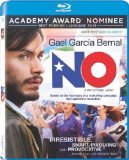| Reviews & Columns |
|
Reviews DVD TV on DVD Blu-ray 4K UHD International DVDs In Theaters Reviews by Studio Video Games Features Collector Series DVDs Easter Egg Database Interviews DVD Talk Radio Feature Articles Columns Anime Talk DVD Savant Horror DVDs The M.O.D. Squad Art House HD Talk Silent DVD
|
DVD Talk Forum |
|
|
| Resources |
|
DVD Price Search Customer Service #'s RCE Info Links |
|
Columns
|
|
|
No
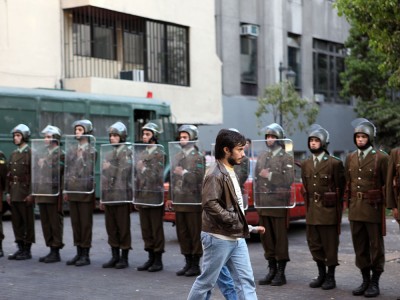
Please Note: The images used here are from stills provided by Sony Pictures Classics and visuals from other promotional sources; are not taken from the current Blu-ray edition under review; and are generally not representative of the intentionally videotape-level quality of the film's actual look.
If the hugely successful (artistically and popularly) Mad Men mines deep into what's clearly some deep-seated American ambivalence about the ad game and what it means to the individuals and society that show so incisively depicts, how much more ambivalent must the culture of Chile be, with its much less straightforward history and cultural attunement to the slick, ceaseless buy-sell aura of consumer capitalism? That's not a question that this reviewer, previously ignorant as to the particulars of the fascinating true history dramatized in No, the latest film from Chilean director Pablo LarraÃn (Tony Manero, Post Mortem), would've thought to ponder before I'd seen it. But, in the way it's brought to our attention in this brilliant, unexpectedly cheeky and slyly moving period piece, the hot blood of an extremely galvanizing recent history pulsing through it, it's a complex and fascinating question to ponder, more than equal to providing all the push-pull dramatic impetus (and not a little well-maneuvered opportunity for low-key but very funny satirical comedy) sufficient to make for an exciting, entertaining, and provocative feature, albeit one that never succumbs to pat triumphalism in its depiction of what was, whatever its complexities, an optimistic, liberating historical moment.
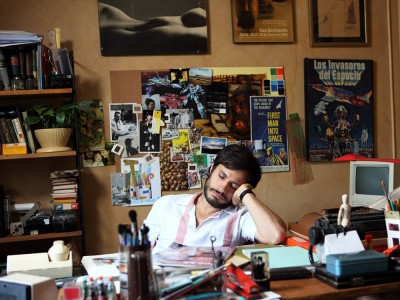
That moment occurred, in Chile, in 1988, when a democratic referendum vote -- forced by mounting international pressure and attention upon the Chilean government's long and violent history of appalling, undemocratic human-rights abuses -- was held to decide whether the people of that nation wished to hold free, democratic national elections or would rather retain a long-running right-wing military dictatorship, which they never chose, at the hands of President Augusto Pinochet (which began in 1973 when Pinochet, then a general, used the country's army to overthrow the democratically-elected socialist government of Salvador Allende). Each side -- "yes" to retain the general's fascistically brutal order-keeping (and implicitly tolerate, if not forgive, a past littered with kidnappings, torture, persecution, and murder of dissidents), "no" for free elections -- would be allotted 15 minutes each evening on all three national TV networks in which to make its case, and that's where LarraÃn's ingenious choice of protagonist -- the happily consumeristic, mostly apolitical René (the ever-admirably-adventurous Mexican actor Gael Garcia Bernal, who's been impressive in everything from Y tu Mama Tambien to Almodovar's Bad Education to Julia Loktev's The Loneliest Planet) -- comes in.
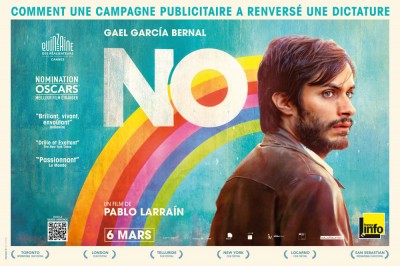
René is a self-involved, careerist ad man in his early thirties who's rejected the leftward-committed values of his parents and his ex-wife (Antiona Zegers), the latter of whom is raising their son and protesting Pinochet's government at great personal risk, leaving René with real regrets but also free to obsess over his sporty car and model trains, and to climb the ladder as a highly-paid creative leader at a Santiago ad agency run by a Pinochet supporter (frequent LarraÃn star Alfredo Castro) and not doing at all badly for itself, the country's violence and rampant economic injustices aside. It's in this state of emotionally troubled but obliviously prosperous bachelorhood that José, a longtime friend/comrade of René's parents, a presence since his childhood, and the leftist ringleader responsible for the "no" campaign, finds him and requests his "consulting" services, a slippery and very reluctantly agreed-to slope that leads to René's full involvement and investment in the "no" campaign, as much out of professional pride/ambition and rivalry with his frenemy of a boss than out of any personal convictions.
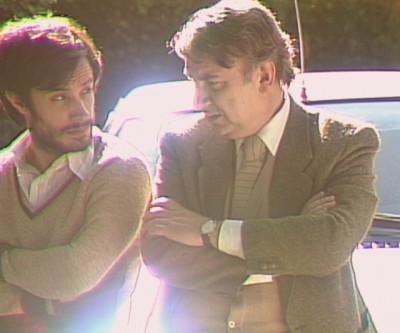
It's people on the same side to which he's been temporarily recruited who are possessed of personal convictions, but no advertising sense, who present him with his greatest obstacles, and this is where all the gray-area, rich paradoxes of the story, spotted and developed very perceptively by screenwriter Pedro Peirano (who co-wrote another very fine Chilean film, The Maid, and is working here from a stage play by Antonio Skarmeta), come in: There's no doubt that "no" is the morally right side to be on, and there's a will-they-prevail suspense built into that, but being right is, as René knows and his disdainfully militant ex-wife and earnest colleagues in the campaign have yet to accept, not the same thing as campaigning successfully and winning. As the film traces René's skirmishes with people who find his peppy, jokey, MTV-like ads repulsive on many levels (and would rather use their 15 minutes to bludgeon the public with traumatic footage, rubbing in Pinochet's oppressiveness, as a reminder of how bad things are), he becomes very real to us as a character, yet through the individual-focused story of René's own inner contradictoriness, his paradoxical position subtly accrues and reveals its significance, until he becomes the perfect emblem for a moment in Chilean history that, in superficial terms, was something like a triumphant South American version of the fall of the Berlin Wall (with the roles of crumbling oppressor played by the right this time, and the celebratory freedom-fighters by the left), but was in real life, like the fate of the post-communist Russia and Soviet Bloc, rife with ironic reversals, snags, and turbulent complications -- not least among which, at least in Chile's case, that the un-serious purveyor of soda pop, suspiciously slick and representative of anything but a Marxist way of thinking or living, would be so key to that side's vindication at the ballot box at such a make-or-break point.
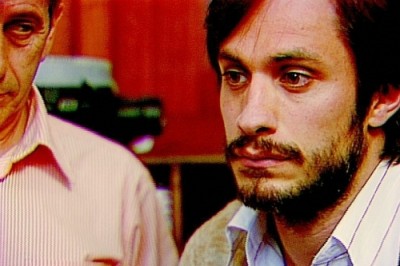
There's a lot of surprising humor that comes out of the incongruity of chipper, very '80s (all bright aerobics attire and Walkman-sporting Michael Jackson dance moves) TV ads being used to achieve a victory for a deadly-serious, beaten-down political "minority" (by the dictator's count, at least, which is always the accurate one); not since the incidental TV-ad parodies Almodovar has been prone to throwing in to his films has the nonsensical cheeriness of advertisements been so deliriously funny, except a great deal of this footage is real archival stuff. But LarraÃn expands hugely upon the period detail, blending the satire inherent in the evocation of such a dubious period for the dominant fashions (René's carefully cultivated rat tail is just the tip of the iceberg) with a deep-down, embroiling, you-are-there verisimilitude, thanks in significant ways to the sharp eyes of his production and art people (production manager Eduardo Castro, art director Estefania LarraÃn), but primarily through the singularly audacious step of shooting the entire thing on the "U-Matic" camcorder actually in wide use for shooting TV news segments at the time, which allows René's personal drama to enmesh and flow seamlessly well with the bigger history in which he's playing an unlikely part, not just thematically, but by expertly matching the look of his home and work lives with the copious real advertising and news footage (as well as some vitally distressing snippets from the films of LarraÃn's elder and in some ways spiritual forebear, the great Pinochet-legacy documentarian Patricio Guzmán) incorporated by LarraÃn. The washed-out, drained, and blurry videotape look is disorienting but strangely convincing; it's no gimmick, but a well-advised, entirely relevant and well-integrated conceptual decision executed with supreme skill and confidence, firmly placing us, at all times, behind the eyes of an average, undecided, (and quite possibly apolitical, fed-up, fearful, or cynical) Chilean TV viewer in late 1988; it distances us on the level of the normal visual pleasures associated with cinema, but works very effectively to draw us much closer, experientially, than would have seemed possible to an event remote in time and (for those of us outside South America) and space.
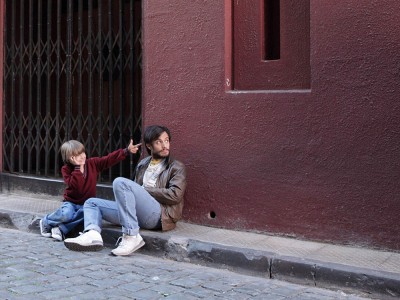
No marks the third time in a row (after Tony Manero and Post Mortem) that LarraÃn has evoked the dreadful Pinochet years obliquely, through the story of a man implicated very much in spite of himself in the vicissitudes of history, and even though No's humorous, wry, optimistic tone seems 180 degrees from the stifled, funereal grace of Post Mortem, it's an apt continuation (conclusion?) of LarraÃn's deep-delving investigations into his country's past, an astute complement to the quiet, slow, silently desperate nightmare so petrifyingly put onto the screen in Post Mortem. LarraÃn's inspired ability to find and utilize just the right visual and dramatic language for bringing to life Chile's waking from Pinochet's terrible anesthesia solidifies his place within a now juggernaut-level generation of awesomely fluent, impassioned, creative, and aware South American filmmakers that also includes Argentina's Lucretia Martel The Headless Woman) and Lisandro Alonso (Liverpool) and Brazil's Kleber Mendonça Filho (Neighboring Sounds). It's always a challenge to capture and convey the subtleties and ambiguity of a galvanizing historical episode in a fictional work, but that's a challenge to which LarraÃn adeptly rises, and he overcomes it with great finesse and exuberant filmmaking; from the enlightening historical lesson it contains within its dramatic tapestry to the perpetual, always-concurrent concerns of mundane life it keeps returning to (with a great, question-raising zinger at the end reminding us of how some things stay the same, despite welcome political sea changes), it honors both the microcosm and the macrocosm of life during troubled times with remarkable alacrity and thoroughness. As a fictionalized snapshot of real history, it's bound to be incomplete, but it stretches those inbuilt limits fruitfully, with a powerful but rigorous persistence. The result is a full, complicated, respectful, yet always questioning and critical view of a history that, as No scrupulously refuses to let us forget, is really only beginning, and with much uncertainty at that, when the film cuts to black.
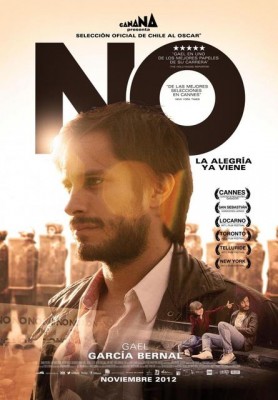
Video:
Here's one case where a blurry, bleary, flat and washed-out look to the image means that it is a very fine transfer; this AVC/MPEG-4 encoded, 1080/24p-mastered affair, presents the film at the unusual 1.40:1 aspect ratio of the TV-news "U-Matic" video camera in wide use in 1988, also reproducing that particular vintage videotape texture, color, and tone for well-considered reasons of historical accuracy and fidelity via a more primitive-looking technology. It's a most effective aesthetic choice, the film appearing this way to us (we feel as if we're seeing just exactly what any Chilean TV viewer would have seen as they watched the run-up to and results of the big vote in 1988), and it's a meticulously prepared appearance that's re-created perfectly for our home screens via this transfer.
Sound:The DTS-HD Master Audio 5.1 soundtrack (in Spanish with optional English, English SDH, and French subtitles) reveals that the film's sound design, unlike the image, is fully up-to-date and surround-sound sophisticated. It integrates with surprising ease, though; it's not until reflecting upon it that the fact that the sound made by René's model train set seems to be going around the entire perimeter your viewing space seems incongruous with the fact that it appears as a washed-out, soft-edged blur on your screen. Objectively speaking, the sound is wonderfully presented, with all dialogue sounding rich and immediate, all crowd/ambient sound and music clear, deep, and vibrant, and no distortion or imbalance at any point.
Extras:--Feature audio commentary with director Pablo LarraÃn and star Gael Garcia Bernal (in English), in which the two amiably (with plenty of affable jokes between them) recount their experience of creating the film, their multifaceted dramatic and historicizing intentions, casually and interestingly offering up much additional historical/period contextualization along the way.
--Ten minutes' worth of excerpts from a Q&A with star Gael Garcia Bernal after a screening of the film at the 2012 Toronto International Film Festival.
--The film's U.S. theatrical trailer.
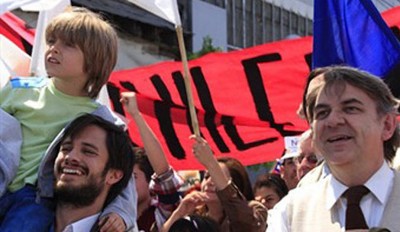
A surprisingly buoyant, often wryly satirical film about the 1988 vote that finally freed Chile from military dictatorship, No uses its risky, meticulously re-created TV-news-style aesthetic not for nostalgia but for immediacy, and it makes for a deep experience as emotionally involving and thought-provoking as it is wholly of another time. In surveying the difficult, doubtful, and often even dangerous campaign to unseat ruthless Chilean dictator Augusto Pinochet through the experience of an ad man (Gael Garcia Bernal) who's embraced the laissez-faire, apolitical, materialistic values of the '80s and shares few of the passionate political convictions of his elders, LarraÃn personalizes the murky, indirect quality of the relationship between politics and daily life but at the same time subtly, gently, and convincingly insists that the connection is, indeed, there. LarraÃn's combination of sensitive dramatization, astute visual conception, and a strong, deeply felt sense of his nation's troubled history makes for a film whose very ambivalence -- about Chile's extremely divisive past, and especially about the commercial-capitalist methods used to topple a dictator who rose to power usurping, suppressing, and killing leftists and their supporters in the name of ostensibly bringing American-style commercial capitalism to Chile -- is never vague or overly partisan, but provocative, riveting, complex and critically-thinking and honest. If LarraÃn's integrity and honesty led to the power of his last film -- 2010's Post Mortem, set 15 years earlier than No, in the deadened, quietly horrific and deeply destructive immediate aftermath of Pinochet's violent rise to power -- to manifest through a very different aesthetic and to arise from a much more somber, eerie, haunted, and despondent place, it leads to equally incisive but markedly different choices in No. Not that there's nothing mindlessly celebratory about No, but nor is it afraid to lighten and loosen up as it depicts the paradoxical toppling of a hated regime by peppy, cheesy ad campaigns concocted not by right-minded leftists but by an utterly human, more or less mercenary and self-involved careerist whose personal values are, to the extent that he can be said to have them, middle of the road and status-quo at best. The film accepts that no change or victory (and very, very few people, whatever their convictions) is really unequivocally ideologically pure, and it does so with rich generosity and great, forbearingly comic good humor. However aptly sardonic, regretful, and still full of unanswered questions the expression might be, No is ultimately history with some kind of smile on its face, and its maker's deftness and insight is such that we never feel it's anything less than well-earned. Highly Recommended.
|
| Popular Reviews |
| Sponsored Links |
|
|
| Sponsored Links |
|
|
| Release List | Reviews | Shop | Newsletter | Forum | DVD Giveaways | Blu-Ray | Advertise |
|
Copyright 2024 DVDTalk.com All Rights Reserved. Legal Info, Privacy Policy, Terms of Use,
Manage Preferences,
Your Privacy Choices | |||||||









